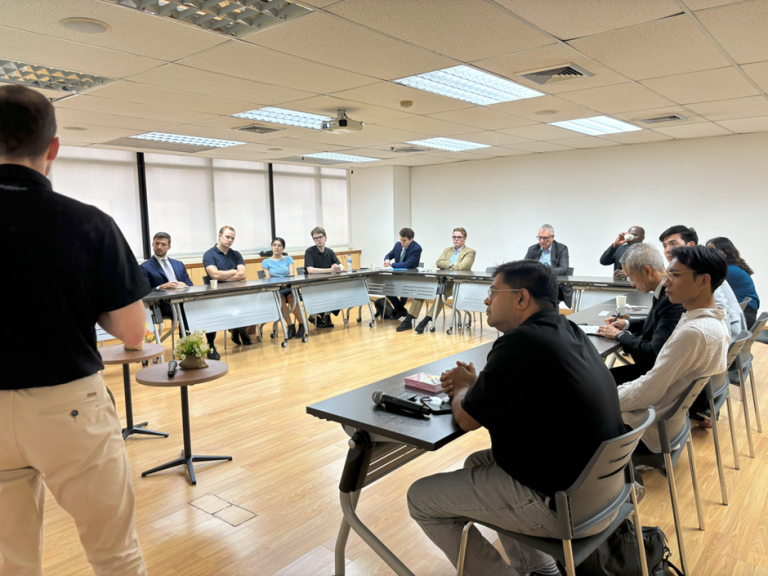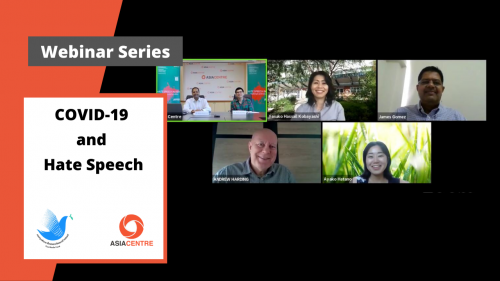
Counterpart International (CI) was a new title partner in Asia Centre’s 9th International Conference, held from 21 to 23 August 2024 in Bangkok, Thailand, under the theme “Shrinking Civic Space in Asia: Stories of Resistance and Pushback”. CI’s contributions throughout the Conference centred on the need to develop a comprehensive blueprint to guide the reopening of civic spaces and safeguard democratic values. This message emphasised the importance of strategic planning and actionable approaches to counteract the restrictions on civic freedoms and to promote resilience within the region’s civil society. Through its involvement, CI underscored the critical need for coordinated efforts and innovative solutions to combat shrinking civic spaces in Asia.
On 23 August 2024, CI convened a panel titled “Strategies for Defending and Expanding Civic Space: Tactics for Building Positive Relationships with Decision Makers.” This session was designed to equip civil society leaders and activists with practical tools and tactics for cultivating constructive relationships with decision-makers. The panel aimed to foster collaboration and enhance the ability of civil society organisations to navigate and expand civic spaces, even in the face of restrictive environments.

Arzak Khan, Digital Policy Expert at Innovation for Change – South Asia Hub in Pakistan, emphasised the importance of developing strategies to build effective and positive relationships with decision-makers. He noted the complexities of navigating bureaucratic systems, suggesting that untangling these structures is crucial for identifying barriers to opening civic spaces and highlighted the necessity of direct lobbying, coalition-building, and networking as key tactics for engaging a wide range of actors, from supporters to decision-makers. His insights underscored the need for strategic engagement and collaboration to overcome obstacles and advance the cause of expanding civic spaces.
Sarah Little, Governance & Civil Society Specialist at Counterpart International, introduced a framework for Civil Society Resilience in Closing Spaces. This framework, she emphasised, is designed as practical guidance for CSOs to navigate and respond to the challenges posed by shrinking civic spaces, stressing its importance in classifying civic spaces based on their levels of openness or vulnerability to closure. Such classification is crucial for effectively identifying and engaging with the sectors and agents responsible for these closures. The framework aims to provide actionable strategies and best practices to help CSOs address and counteract the erosion of civic space. By offering a structured approach to understanding and responding to these challenges, the framework seeks to bolster the resilience of civil society in increasingly restrictive environments.
Kourtney Pompi, Senior Director of Governance at Counterpart International, emphasised the critical connection between the tool presented, ‘Civil Society Resilience in Closing Spaces’ and its practical implementation. For the tool to be effective, she said it is important to map and identify the sectors and actors that are affected by restrictive civic spaces before implementation. She also highlighted the need to address the various dimensions of civic space – such as its political, digital or economic nature – and the challenges posed by limited resources, time, and personnel in the effort to expand and open up these spaces. Pompi stressed that civic spaces are not uniform; while some situations may require active pushing or challenging of governments to effect change, other scenarios might benefit more from fostering constructive dialogue and building effective relationships. Her insights underscored the importance of tailoring approaches to the specific context and needs of each civic space, recognising that flexibility and strategic engagement are essential for advancing civic freedoms.
Flora Soriano Menezes from the Judicial System Monitoring Programme (JSMP) at Counterpart International outlined the organisation’s strategy to improve court processes in Timor-Leste. She stressed the need for effective communication within the judiciary, mandatory recording of court proceedings, and adherence to international standards. She highlighted the success of JSPM’s focus on legal assistance, education, and advocacy, demonstrated by the National Parliament’s collaboration with JSMP on legislation. Additionally, Soriano Mendez noted that political instability, restrictive defamation laws, and conservative norms occasionally threaten Timor-Leste’s civic space.
After the presentations, participants engaged in a lively Q&A session, where they posed pertinent questions and sought clarifications on the topics discussed. A prominent discussion point was the management of risks associated with decision-making when engaging with stakeholders, including bureaucrats and policymakers. The panel underscored the importance of avoiding close associations with any single stakeholder, suggesting a strategy that involves mapping key stakeholders and tracking their influence and relevance. This approach is particularly crucial in the event of a government shift, as it helps in diversifying collaborations and maintaining professional relationships to mitigate risks. The panel recognised that significant policy changes often require time, and thus, maintaining a broad network is essential.

The session concluded with an interactive segment addressing Civil Society Resilience in Closing Spaces, where the audience assessed the state of civic space in their respective countries. Participants mapped and visualised the dimensions of civic space using varying colours to illustrate different levels of openness and restrictions. They also shared innovative ideas on how to bolster the resilience of civil society, contributing to a comprehensive discussion on strengthening civic engagement and advocacy.

The urgent need to re-open civic spaces was also underscored during the welcome remarks on 22 August 2024 by Sarah Little, Governance & Civil Society Specialist at Counterpart International (CI). She highlighted the need to strengthen democracy and open up civic spaces. Her address set the stage for CI’s involvement throughout the event, including a panel that focused on instances of progress in defending open civic spaces and exploring strategies to counteract the backlash against these freedoms. She also underscored the significance of the partnership between the Asia Centre and CI, particularly mentioning the Global Coalition for Democracy (GDC), co-convened by CI and International IDEA. The Asia Centre is a member of this coalition, along with other institutions present at the conference – such as CALD and the International Republican Institute (IRI) – in a unified effort to strengthen and protect democracy and civic spaces.
Asia Centre’s 9th Annual International Conference was the first occasion in which the Asia Centre and Counterpart International partnered to make a joint effort and strengthen civil society in Asia. The Asia Centre hopes that Counterpart International’s participation in this year’s conference is the beginning of a partnership that can result in future collaborations, including evidence-based research, training and capacity-building activities, and advocacy.
The International Conference is Asia Centre’s annual event where it brings together its partners to share the outcomes of their programmes and network for future collaborations. Over the years, the conference has become a platform for a range of actors to meet and discuss key democracy and human rights issues.
To view the main conference article, articles on individual title partners, as well as TikTok videos and a photo album, read the main conference piece here.
If you would like to become a Conference partner for Asia Centre’s 10th International Conference “AI and Governance in Asia” or explore other collaboration opportunities, email us at contact@asiacentre.org. For more information, click here.
Asia Centre is a civil society research institute in Special Consultative Status with the United Nations Economic and Social Council. It serves as a knowledge partner and undertakes evidence-based research as well as provides capacity-building training for end beneficiaries. If you would like to collaborate with the Centre, please send an expression of interest to contact@asiacentre.org.
Follow Asia Centre’s social media channels for more information.




